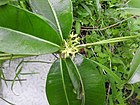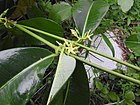Note: This is a project under development. The articles on this wiki are just being initiated and broadly incomplete. You can Help creating new pages.
Difference between revisions of "Cryptolepis buchanani"
(Created page with "{{stub}} ==Uses== {{Uses|}}, {{Uses|}}, {{Uses|}}, {{Uses|}}, {{Uses|}}, {{Uses|}}, {{Uses|}}, {{Uses|}}, {{Uses|}}, {{Uses|}}, {{Uses|}}.<ref name="Uses"/> ==Parts Used== {...") |
|||
| (21 intermediate revisions by the same user not shown) | |||
| Line 1: | Line 1: | ||
| − | + | [[File:Cryptolepis buchanani-2-yelagiri-vellore-India.jpg|thumb|right]] | |
| − | + | '''Cryptolepis buchanani''' is much branched, Large climbing shrub. Purplish red when young peeling off in papery flakes and It will become brown when old. | |
==Uses== | ==Uses== | ||
| − | {{Uses|}}, {{Uses|}}, {{Uses|}}, {{Uses|}}, {{Uses|}} | + | {{Uses|Appetitis}}, {{Uses|Fever}}, {{Uses|Skin diseases}}, {{Uses|Leprosy}}, {{Uses|Rickets}}<ref name="Uses"/> |
==Parts Used== | ==Parts Used== | ||
| − | {{Parts Used|}}, {{Parts Used| | + | {{Parts Used|Roots}}, {{Parts Used|Stem}}<ref name="Karnataka Medicinal Plants"/> |
==Chemical Composition== | ==Chemical Composition== | ||
| Line 11: | Line 11: | ||
==Common names== | ==Common names== | ||
| − | {{Common names|sa=|en=|gu=|hi=|kn=|ks=|ml=|mr=|pa=|ta=|te=}} | + | {{Common names|sa=Krishna sariva|en=Indian Sarsaparilla|gu=|hi=Karanta|kn=Medhagulihambu|ks=|ml=Kattupalvalli|mr=|pa=|ta=Paalkodi|te=Adavipaalatige}}<ref name="Karnataka Medicinal Plants"/> |
| + | |||
==Properties== | ==Properties== | ||
| Line 17: | Line 18: | ||
===Dravya=== | ===Dravya=== | ||
===Rasa=== | ===Rasa=== | ||
| − | |||
===Guna=== | ===Guna=== | ||
| Line 34: | Line 34: | ||
==Identification== | ==Identification== | ||
===Leaf=== | ===Leaf=== | ||
| − | {{Leaf|||}}<ref name="Leaf"/> | + | {{Leaf|Elliptic, Oblong or oblong – Lanceolate|Acute or Acuminate|Leaves are 7.5 – 12.5 cm X 3.8 – 6.3 cm in size, green above and whitish beneath}}<ref name="Leaf"/> |
===Flower=== | ===Flower=== | ||
| − | {{Flower||||}} | + | {{Flower|Ovate-lanceolate with scarious margins||Greenish yellow or Yellow white||Flowering season is December to May}} |
===Fruit=== | ===Fruit=== | ||
| − | {{Fruit||||||}} | + | {{Fruit|Follicle|2.5-10 cm long|||Seeds are 0.5 cm long in size, ovate-oblong, compressed and black in colour|Fruiting season is December to May}} |
===Other features=== | ===Other features=== | ||
| Line 49: | Line 49: | ||
==Mode of Propagation== | ==Mode of Propagation== | ||
| − | {{Propagation|}} | + | {{Propagation|Seeds}} |
==How to plant/cultivate== | ==How to plant/cultivate== | ||
| − | <ref name="How to plant/cultivate"/> | + | The crop prefers well-drained sandy-loam acidic soils with abundant organic matter (4.5 to 6.0).<ref name="How to plant/cultivate"/> |
==Commonly seen growing in areas== | ==Commonly seen growing in areas== | ||
| Line 59: | Line 59: | ||
==Photo Gallery== | ==Photo Gallery== | ||
<gallery class="left" caption="" widths="140px" heights="140px"> | <gallery class="left" caption="" widths="140px" heights="140px"> | ||
| − | + | File:Cryptolepis buchanani-1-yelagiri-vellore-India.jpg | |
| + | File:Cryptolepis buchanani-2-yelagiri-vellore-India.jpg | ||
</gallery> | </gallery> | ||
==References== | ==References== | ||
<references> | <references> | ||
| + | <ref name="chemical composition">[Chemistry]</ref> | ||
| + | <ref name="Leaf">Kappatagudda - A Repertoire of Medicianal Plants of Gadag by Yashpal Kshirasagar and Sonal Vrishni, Page No. 146 | ||
| + | </ref> | ||
| + | <ref name="How to plant/cultivate">[https://vikaspedia.in/agriculture/crop-production/package-of-practices/medicinal-and-aromatic-plants/cryptolepis-buchananii-1 Cultivation]</ref> | ||
| + | <ref name="Uses">Karnataka Medicinal Plants Volume - 2 by Dr.M. R. Gurudeva, Page No. 587</ref> | ||
| − | <ref name=" | + | <ref name="Karnataka Medicinal Plants">"Karnataka Medicinal Plants Volume - 2" by Dr.M. R. Gurudeva, Page No.590, Published by Divyachandra Prakashana, #45, Paapannana Tota, 1st Main road, Basaveshwara Nagara, Bengaluru. </ref> |
| − | |||
| − | |||
| − | |||
</references> | </references> | ||
==External Links== | ==External Links== | ||
| − | * [ ] | + | * [https://vikaspedia.in/agriculture/crop-production/package-of-practices/medicinal-and-aromatic-plants/cryptolepis-buchananii-1 Cryptolepis buchanani on vikaspedia.in] |
| − | + | ||
| − | |||
[[Category:Herbs]] | [[Category:Herbs]] | ||
| + | [[Category:Pages without herbs images]] | ||
Latest revision as of 16:31, 23 June 2023
Cryptolepis buchanani is much branched, Large climbing shrub. Purplish red when young peeling off in papery flakes and It will become brown when old.
Contents
- 1 Uses
- 2 Parts Used
- 3 Chemical Composition
- 4 Common names
- 5 Properties
- 6 Habit
- 7 Identification
- 8 List of Ayurvedic medicine in which the herb is used
- 9 Where to get the saplings
- 10 Mode of Propagation
- 11 How to plant/cultivate
- 12 Commonly seen growing in areas
- 13 Photo Gallery
- 14 References
- 15 External Links
Uses
Appetitis, Fever, Skin diseases, Leprosy, Rickets[1]
Parts Used
Chemical Composition
Common names
| Language | Common name |
|---|---|
| Kannada | Medhagulihambu |
| Hindi | Karanta |
| Malayalam | Kattupalvalli |
| Tamil | Paalkodi |
| Telugu | Adavipaalatige |
| Marathi | |
| Gujarathi | |
| Punjabi | |
| Kashmiri | |
| Sanskrit | Krishna sariva |
| English | Indian Sarsaparilla |
Properties
Reference: Dravya - Substance, Rasa - Taste, Guna - Qualities, Veerya - Potency, Vipaka - Post-digesion effect, Karma - Pharmacological activity, Prabhava - Therepeutics.
Dravya
Rasa
Guna
Veerya
Vipaka
Karma
Prabhava
Habit
[[:Category:Habit - |]]
Identification
Leaf
| Kind | Shape | Feature |
|---|---|---|
| Elliptic, Oblong or oblong – Lanceolate | Acute or Acuminate | Leaves are 7.5 – 12.5 cm X 3.8 – 6.3 cm in size, green above and whitish beneath |
Flower
| Type | Size | Color and composition | Stamen | More information |
|---|---|---|---|---|
| Ovate-lanceolate with scarious margins | Greenish yellow or Yellow white | Flowering season is December to May |
Fruit
| Type | Size | Mass | Appearance | Seeds | More information |
|---|---|---|---|---|---|
| Follicle | 2.5-10 cm long | Seeds are 0.5 cm long in size, ovate-oblong, compressed and black in colour | Fruiting season is December to May |
Other features
List of Ayurvedic medicine in which the herb is used
Where to get the saplings
Mode of Propagation
How to plant/cultivate
The crop prefers well-drained sandy-loam acidic soils with abundant organic matter (4.5 to 6.0).[5]
Commonly seen growing in areas
[[:Category:Herbs that are commonly seen in the region of |]], [[:Category:Herbs that are commonly seen in the region of |]], [[:Category:Herbs that are commonly seen in the region of |]], [[:Category:Herbs that are commonly seen in the region of |]], [[:Category:Herbs that are commonly seen in the region of |]].
Photo Gallery
References
- ↑ Karnataka Medicinal Plants Volume - 2 by Dr.M. R. Gurudeva, Page No. 587
- ↑ 2.0 2.1 "Karnataka Medicinal Plants Volume - 2" by Dr.M. R. Gurudeva, Page No.590, Published by Divyachandra Prakashana, #45, Paapannana Tota, 1st Main road, Basaveshwara Nagara, Bengaluru.
- ↑ [Chemistry]
- ↑ Kappatagudda - A Repertoire of Medicianal Plants of Gadag by Yashpal Kshirasagar and Sonal Vrishni, Page No. 146
- ↑ Cultivation
External Links
- Ayurvedic Herbs known to be helpful to treat Appetitis
- Ayurvedic Herbs known to be helpful to treat Fever
- Ayurvedic Herbs known to be helpful to treat Skin diseases
- Ayurvedic Herbs known to be helpful to treat Leprosy
- Ayurvedic Herbs known to be helpful to treat Rickets
- Herbs with Roots used in medicine
- Herbs with Stem used in medicine
- Herbs with common name in Kannada
- Herbs with common name in Hindi
- Herbs with common name in Malayalam
- Herbs with common name in Tamil
- Herbs with common name in Telugu
- Herbs with common name in Sanskrit
- Herbs with common name in English
- Habit -
- Index of Plants which can be propagated by Seeds
- Herbs that are commonly seen in the region of
- Herbs
- Pages without herbs images


